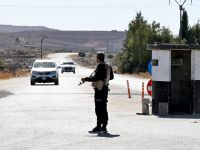The Saudi peace proposal for the Middle East, the focus of a crucial Mideast summit Wednesday in Lebanon, calls for an end to the Israel-Arab conflict in exchange for a complete Israeli withdrawal from disputed territories, according to a draft received by the Palestinians.
However, it leaves the highly sensitive issue of Palestinian refugees open to broad interpretations that could torpedo the initiative. In addition, Israel rejects the main element - a pullback from all disputed territories, according to AP.
There have been other reports on the Saudi proposal, however, this appears to be the first draft of the plan released to the public.
In some of those other reports, the plan called for the Arab world to have peaceful relations and normalized ties with Israel. This wording is not included in the draft received by the Palestinians. Responding to objections by some Arab states to making peace with Israel, the Saudis now call only for an end to the conflict, apparently a step down from peaceful relations.
In exchange, Israel would withdraw from all the territories it captured in the 1967 war. The proposal is to be discussed at the Arab League summit this week in Beirut, Lebanon.
A copy of the Saudi draft obtained by The Associated Press from Palestinian officials, who insisted on anonymity, proposes that Israel would pull out of all of the West Bank, Gaza Strip, east Jerusalem, Golan Heights and disputed parts of Lebanon.
The Palestinians would set up a state in the West Bank, Gaza and Jerusalem, according to the proposal.
In exchange, the Arab world would "consider that the Arab-Israeli conflict is over and draft a treaty that would cement this between the Arab countries and Israel."
The draft calls on Israel to accept the plan so that "Arab countries and Israel (could) coexist and live side by side."
Furthermore, on the issue of refugees, the draft called for accepting "a fair solution ... that will be agreed on in accordance with United Nations Resolution 194."
The resolution, passed in December 1948 during a cease-fire in the two-year war that followed establishment of the state of Israel, calls for speedy repatriation of Palestinian refugees to their original homes for those who choose to return and compensation for those who do not.
The Palestinians say this "right of return" applies to the original refugees and all their descendants, around 4 million people. Israel refuses to take in so many Palestinians, saying it would undermine the Jewish character of Israel.
The phrases "fair solution" and "agreed upon" might conflict with the Palestinian interpretation of the resolution, but the Israelis would not be likely to sign a document that gives legal standing to Resolution 194, a non-binding General Assembly statement, according to AP.
Meanwhile, Israel's government also objects to the key element of the plan, a full withdrawal from the territories captured in 1967.
Israeli Prime Minister Ariel Sharon has said that a return to the old borders would endanger Israel's security. Moreover, Israel claims all of Jerusalem as its capital and rejects the Palestinian demand for a capital in the Arab section of the city, among the territories occupied in 1967. (Albawaba.com)
© 2002 Al Bawaba (www.albawaba.com)







